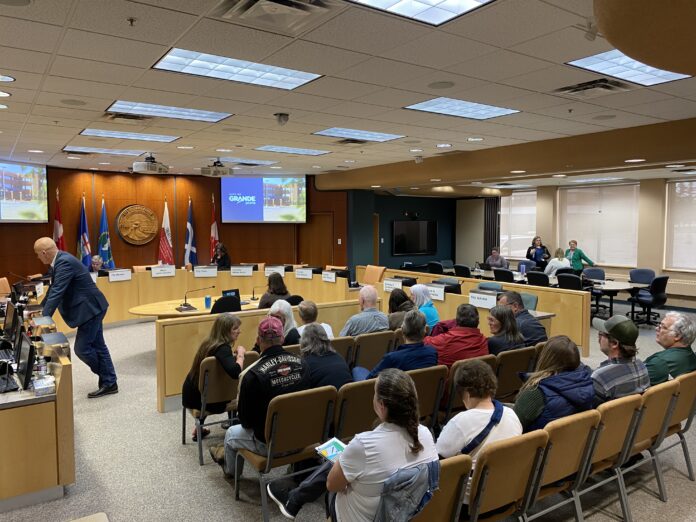After a lengthy late-night council meeting that included a public hearing regarding the proposed changes to secondary suites in the city, Grande Prairie City Council opted to delay the third and final reading of the bylaw to their next meeting in two weeks.
Mayor Jackie Clayton describes the proposed changes as a “relatively quick fix” to the housing shortages experienced by potential renters in the city.
“When we’re looking to attract people to our region and rentals are not available it really can limit your growth,” she says.
According to the Mayor, building new multi-family living arrangements such as larger apartment buildings are simply not coming to Grande Prairie right now as developers face higher building costs due to inflation, and relaxing some of the requirements for a homeowner to build a secondary suite seems to be the most appropriate action at this time.
More than twenty residents attended the hearing to speak for and against the proposed changes, and by far, the number one concern among those against the changes was parking congestion.
Currently, secondary suites require one additional parking stall per bedroom in a secondary suite; however, the proposed changes would see one less stall per bedroom if passed, down to zero parking stalls for a one-bedroom or bachelor suite. As a result, council approved one amendment to the proposal, requiring at least one parking stall for a one-bedroom suite.
Despite the changes, some residents remain concerned regarding the potential parking congestion that additional secondary suites in a neighbourhood could cause; however, Mayor Clayton says parking remains a tough issue for city council to navigate, even without secondary suites.
“Concerns of parking can happen without secondary suites in your neighbourhood,” she says. “We live in a community where most families have at least two vehicles and so parking continues to be an issue, [and] finding ways to mitigate the impact in neighbourhoods is a constant struggle.”
The Mayor says the change in parking requirements will limit the areas where legal secondary suites can be added. She adds that despite their concerns, residents should also consider that not everyone can afford to install a secondary suite even if the proposed changes pass.
“Besides the fact that not everybody can afford to necessarily put a secondary suite in, not everybody wants renters in their house and so with those parameters and the amendment, you won’t get to the numbers that some of the residents were concerned about.”
Additional concerns surrounding issues like the impacts of redevelopment changes in a neighbourhood, and the removal of size restrictions for suites were also brought up during the meeting; however, those in favour cite the cost of living, affordable housing needs, and multi-generational housing as positives should the proposed changes pass in two weeks.
Ultimately, the consensus among councillors at the end of the meeting was one that more information is needed before making the final decision on the matter, and as a result, council will make their decision during their next Monday meeting.




